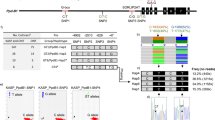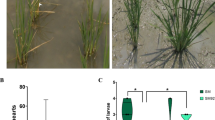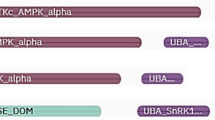Abstract
SKP1 (S-phase kinase protein1) is an essential regulatory component of SCF (Skp1-cullin-F-box) E3 ubiquitin ligases involved in maintenance of cellular protein homeostasis through ubiquitin mediated proteasome system (UPS). UPS play a key role in stress response and grain yield. Earlier, we isolated TaSKP1-6B-4, highly induced in flag leaf tissues (Accession No. KJ830759.1) of developing wheat caryopses under heat stress. To further assess the functional role of SKP1, genetic variability analysis was carried out in a panel of 25 contrasting germplasm through extensive phenotyping and transcript profiling of TaSKP1-6B-4 during anthesis under ambient and terminal heat stress (THS) in field experiments for two consecutive years. The analysis of variance revealed significant variations for all the traits studied. Higher H2(%), GCV, PCV, GA and GA% mean observed in tiller number per plant (23.81, 17.65, 5.71, 28, 30.86%) and grain number per head (30.27, 82.79, 60.16, 105.00, 108.64%) under THS over ambient temperature. Higher fold induction of TaSKP1-6B-4 transcripts was recorded in 10 genotypes viz. HD2967 (9.9), IC145456 (6.18) in flag leaf; while C-306 (15.88), RAJ3765 (8.37) in ear head. Allele mining of SKP1-6B-4 showed genotypic sequence variations. Whole genome wide search of SKP1 gene family identified 95 SKP1 genes which were structurally characterized. Grain yield, leaf senescence and other agronomic-morpho-physiological parameters combined with transcript profiling, cvHD2967, was found to be the best positively responsive to THS which by pedigree was not heat tolerant. We report a novel 2 year comprehensive field based analysis on collective genetic variability and SKP1/UPS modulation under a natural environmental setting. The data reveals potential functional role of UPS under THS and tolerant cultivars can be further utilized for clarifying the role of UPS mechanistically at the molecular level and for developing terminal heat stress tolerant wheat.
Key messages
Genetic diversity and transcript profiling of heat inducible gene in a field experiment collectively identify terminal heat stress tolerant wheat cultivars and involvement of UPS to tackle climate adversity.








Similar content being viewed by others
Data availability
The sequence data and accession numbers mentioned here can be found on the NCBI website at (https://www.ncbi.nlm.nih.gov).
Abbreviations
- TN/P:
-
Tiller number/plant
- FLL:
-
Flag leaf length
- FLW:
-
Flag leaf width
- PH:
-
Plant height
- PDL:
-
Peduncle length
- SN/P:
-
Spike number/plant
- SL:
-
Spike length
- GN/H:
-
Grain number/head
- TW:
-
Test weight
- DOB:
-
Days of booting
- DOA:
-
Days of anthesis
- DOPA:
-
Days of post anthesis
- H2 (%):
-
Analysis of heritability (percent)
- GCV:
-
Genotypic coefficient of variation
- PCV:
-
Phenotypic coefficient of variation
- GA:
-
Genetic advance
- GA% mean:
-
Genetic advance value % mean
- HS:
-
Heat stress (HS)
- ROS:
-
Reactive oxygen species
References
Adams EHG, Spoel SH (2018) The ubiquitin–proteasome system as a transcriptional regulator of plant immunity. J Exp Bot 69(19):4529–4537. https://doi.org/10.1093/jxb/ery216
Asseng S, Ewert F, Martre P, Rötter RP, Lobell DB, Cammarano D et al (2015) Rising temperatures reduce global wheat production. Nat Clim Chang 5(2):143–147. https://doi.org/10.1038/nclimate2470
Bailey TL, Boden M, Buske FA, Frith M, Grant CE, Clementi L, Ren J, Li WW, Noble WS (2009) MEME SUITE: tools for motif discovery and searching. Nucleic Acids Res 37(Web Server):W202–W208. https://doi.org/10.1093/nar/gkp335
Belay G, Tesemma T, Becker HC, Merker A (1993) Variation and interrelationships of agronomic traits in Ethiopian tetraploid wheat landraces. Euphytica 71:181–188
Bennett D, Reynolds M, Mullan D, Izanloo A, Kuchel H, Langridge P, Schnurbusch T (2012) Detection of two major grain yield QTL in bread wheat (Triticum aestivum L.) under heat, drought and high yield potential environments. Theor Appl Genet 125(7):1473–1485. https://doi.org/10.1007/s00122-012-1927-2
Bokshi AI, Tan DKY, Thistlethwaite RJ, Trethowan R, Kunz K (2021) Impact of elevated CO2 and heat stress on wheat pollen viability and grain production. Funct Plant Biol 48(5):503. https://doi.org/10.1071/fp20187
Castelán-Muñoz N, Herrera J, Cajero-Sánchez W, Arrizubieta M, Trejo C, García-Ponce B, Garay-Arroyo A (2019) MADS-Box genes are key components of genetic regulatory networks involved in abiotic stress and plastic developmental responses in plants. Front Plant Sci. https://doi.org/10.3389/fpls.2019.00853
Chatzopoulos T, Domínguez IP, Toreti A, Adenäuer M, Zampieri M (2021) Potential impacts of concurrent and recurrent climate extremes on the global food system by 2030. Environ Res Lett 16(12):124021. https://doi.org/10.1088/1748-9326/ac343b
Dutta M, Phogat BS, Kumar S, Kumar N, Kumari J, Pandey AC et al (2015) Development of core set of wheat (Triticum spp.) germplasm conserved in the national Genebank in India. In: Advances in wheat genetics: from genome to field: proceedings of the 12th international wheat genetics symposium. Springer, Japan, pp 33–45. https://doi.org/10.1007/978-4-431-55675-6_4
Djanaguiraman M, Boyle DL, Welti R, Jagadish SVK, Prasad PVV (2018) Decreased photosynthetic rate under high temperature in wheat is due to lipid desaturation, oxidation, acylation, and damage of organelles. BMC Plant Biol. https://doi.org/10.1186/s12870-018-1263-z
El Beji IH, Mouzeyar S, Bouzidi MF, Roche J (2019) Expansion and functional diversification of SKP1-like genes in wheat (Triticum aestivum L.). MDPI. https://doi.org/10.3390/ijms20133295
Fokar M, Nguyen HT, Blum A (1998) Heat tolerance in spring wheat I. Estimating cellular thermo tolerance and its heritability. Euphytica. https://doi.org/10.1023/A:1018346901363
Frieler K, Lange S, Piontek F, Reyer CP, Schewe J, Warszawski L, Zhao F, Chini L, Denvil S, Emanuel K, Geiger T (2017) Assessing the impacts of 1.5 C global warming–simulation protocol of the Inter-Sectoral Impact Model Inter comparison Project (ISIMIP2b). Geo Sci Model Dev 10:4321–4345
Hanson WD (1956) Heritability, statistical genetics and plant breeding. NASNRC 981. The National Academies Press, Washington, pp 115–140. https://doi.org/10.17226/20264
Hong MJ, Kim DY, Seo YW (2013) SKP1-like-related genes interact with various F-box proteins and may form SCF complexes with Cullin–F-box proteins in wheat. Mol Biol Rep 10:1007
Hu B, Jin J, Guo AY, Zhang H, Luo J, Gao G (2014) GSDS 2.0: an upgraded gene feature visualization server. Bioinformatics 31(8):1296–1297. https://doi.org/10.1093/bioinformatics/btu817
Hua Z (2023) Deciphering the protein ubiquitylation system in plants. J Exp Bot. https://doi.org/10.1093/jxb/erad354
Hua Z, Vierstra RD (2011) The Cullin-RING ubiquitin-protein ligases. Annu Rev Plant Biol 62(1):299–334. https://doi.org/10.1146/annurev-arplant-042809-112256
Jackson PK, Eldridge AG, Freed E, Furstenthal L, Hsu JY, Kaiser BK, Reimann JD (2000) The lore of the RINGs: substrate recognition and catalysis by ubiquitin ligases. Trends Cell Biol 10(10):429–439. https://doi.org/10.1016/s0962-8924(00)01834-1
Jaiswal P, Sahi AN, Barthakur S (2022) Cytokinin seed priming mediated induction of terminal heat stress tolerance and expression profiling of SKP1 transcripts, a component of ubiquitin proteasome system in bread wheat (Triticum aestivum L.): a transgenerational analysis. Plant Growth Regul 98(2):259–280. https://doi.org/10.1007/s10725-022-00861-6
Jing J, Guo S, Li Y, Li W (2020) The alleviating effect of exogenous polyamines on heat stress susceptibility of different heat resistant wheat (Triticum aestivum L.) varieties. Sci Rep. https://doi.org/10.1038/s41598-020-64468-5
Kahloul S, HajSalah El Beji I, Boulaflous A, Ferchichi A, Kong H, Mouzeyar S, Bouzidi MF (2012) Structural, expression and interaction analysis of rice SKP1-like genes. DNA Res 20(1):67–78. https://doi.org/10.1093/dnares/dss034
Khomdram S, Barthakur S (2015) In situ evaluation of high temperature stress in wheat (Triticum aestivum L.)—validation of a portable heat trap chamber. Ann Agric Res 36(2):123–131
Kong H, Leebens-Mack J, Ni W, dePamphilis CW, Ma H (2004) Highly heterogeneous rates of evolution in the SKP1 gene family in plants and animals: functional and evolutionary implications. Mol Biol Evol 21(1):117–128. https://doi.org/10.1093/molbev/msh001
Kong H, Landherr LL, Frohlich MW, Leebens-Mack J, Ma H, DePamphilis CW (2007) Patterns of gene duplication in the plant SKP1 gene family in angiosperms: evidence for multiple mechanisms of rapid gene birth. Plant J 50(5):873–885. https://doi.org/10.1111/j.1365-313x.2007.03097.x
Kumar S, Archak S, Tyagi RK, Kumar J, Vikas VK, Jacob SR et al (2016) Evaluation of 19,460 wheat accessions conserved in the Indian National Genebank to identify new sources of resistance to rust and spot blotch diseases. PLoS ONE 11(12):e0167702. https://doi.org/10.1371/journal.pone.0167702
Laskowski RA, Jabłońska J, Pravda L, Vařeková RS, Thornton JM (2017) PDBsum: structural summaries of PDB entries. Protein Sci 27(1):129–134. https://doi.org/10.1002/pro.3289
Lescot M (2002) PlantCARE, a database of plant cis-acting regulatory elements and a portal to tools for in silico analysis of promoter sequences. Nucleic Acids Res 30(1):325–327. https://doi.org/10.1093/nar/30.1.325
Liu J, Wiberg DB, Zehnder AJ, Yang H (2007) Modeling the role of irrigation in winter wheat yield, crop water productivity, and production in China. Irrig Sci. https://doi.org/10.1007/s00271-007-0069-9
Liu B, Asseng S, Wang A, Wang S, Tang L, Cao W et al (2017) Modelling the effects of post-heading heat stress on biomass growth of winter wheat. Agric Meteorol 247:476–490. https://doi.org/10.1016/j.agrformet.2017.08.018
Lobell DB, Field CB (2007) Global scale climate–crop yield relationships and the impacts of recent warming. Environ Res Lett 2(1):014002. https://doi.org/10.1088/1748-9326/2/1/014002
Lobell DB, Sibley A, Ivan Ortiz-Monasterio J (2012) Extreme heat effects on wheat senescence in India. Nat Clim Chang 2(3):186–189. https://doi.org/10.1038/nclimate1356
Lovell SC, Davis IW, Arendall WB, de Bakker PIW, Word JM, Prisant MG et al (2003) Structure validation by Cα geometry: ϕ, ψ and Cβ deviation. Proteins 50(3):437–450. https://doi.org/10.1002/prot.10286
Lush J (1949) Heritability of quantitative characters in farm animals. Hereditas 35(S1):356–375. https://doi.org/10.1111/j.1601-5223.1949.tb03347.x
Ma X, Zhang J, Burgess P, Rossi S, Huang B (2018) Interactive effects of melatonin and cytokinin on alleviating drought-induced leaf senescence in creeping bentgrass (Agrostis stolonifera). Environ Exp Bot 145:1–11. https://doi.org/10.1016/j.envexpbot.2017.10.010
Mackinnon E, Stone SL (2022) The ubiquitin proteasome system and nutrient stress response. Front Plant Sci. https://doi.org/10.3389/fpls.2022.867419
Marchler-Bauer A, Bo Y, Han L, He, J, Lanczycki CJ, Lu S et al (2017) CDD/SPARCLE: functional classification of proteins via subfamily domain architectures. Nucleic Acids Res 45(D1):D200–D203. https://doi.org/10.1093/nar/gkw1129
Melo FV, Oliveira MM, Saibo NJM, Lourenço TF (2021) Modulation of abiotic stress responses in rice by E3-ubiquitin ligases: a promising way to develop stress-tolerant crops. Frontiers. https://doi.org/10.3389/fpls.2021.640193
Metzger MB, Hristova VA, Weissman AM (2012) HECT and RING finger families of E3 ubiquitin ligases at a glance. J Cell Sci 125(3):531–537. https://doi.org/10.1242/jcs.091777
Metzger MB, Pruneda JN, Klevit RE, Weissman AM (2014) RING-type E3 ligases: master manipulators of E2 ubiquitin-conjugating enzymes and ubiquitination. Biochim Biophys Acta (BBA) 1843(1):47–60. https://doi.org/10.1016/j.bbamcr.2013.05.026
Miricescu A, Goslin K, Graciet E (2018) Ubiquitylation in plants: signaling hub for the integration of environmental signals. J Exp Bot 69(19):4511–4527. https://doi.org/10.1093/jxb/ery165
Mirosavljević M, Mikić S, Župunski V, KondićŠpika A, Trkulja D, Ottosen C et al (2021) Effects of high temperature during anthesis and grain filling on physiological characteristics of winter wheat cultivars. J Agron Crop Sci 207(5):823–832. https://doi.org/10.1111/jac.12546
Mukhopadhyay D, Riezman H (2007) Proteasome-independent functions of ubiquitin in endocytosis and signaling. Science 315(5809):201–205. https://doi.org/10.1126/science.1127085
Narayanan S, Tamura PJ, Roth MR, Prasad PV, Welti R (2016) Wheat leaf lipids during heat stress: I. High day and night temperatures result in major lipid alterations. Plant Cell Environ 39(4):787–803. https://doi.org/10.1111/pce.12649
Pathak NN, Nema DP (1985) Genetic advance in land-races of wheat. Indian Journal Agricultural Sciences, New Delhi
Randall P, Moss H (1990) Some effects of temperature regime during grain filling on wheat quality. Aust J Agric Res 41(4):603. https://doi.org/10.1071/ar9900603
Reynolds MP, Singh RP, Ibrahim A, Ageeb OAA, Larque-Saavedra A, Quick JS (1998) Evaluating physiological traits to complement empirical selection for wheat in warm environments. Euphytica 100:85–94. https://doi.org/10.1023/A:1018355906553
Sahu S, Dhari R, Joshi AK (2005) Variability studies in wheat (Triticum aestivum L.) under late sown condition. Indian J Genet Plant Breed 65(04):309–310
Schmitz RJ, Grotewold E, Stam M (2022) Cis-regulatory sequences in plants: their importance, discovery, and future challenges. Plant Cell 34(2):718–741. https://doi.org/10.1093/plcell/koab281
Singh A, Singh PK, Sharma AK, Singh NK, Sonah H, Deshmukh R, Sharma TR (2019) Understanding the role of the WRKY gene family under stress conditions in pigeonpea (Cajanus cajan L.). Plants 8(7):214. https://doi.org/10.3390/plants8070214
Stone SL (2014) The role of ubiquitin and the 26S proteasome in plant abiotic stress signaling. Frontiers in Plant Science, 5. https://doi.org/10.3389/fpls.2014.00135
Stone SL (2019) Chapter three- role of the ubiquitin proteasome system in plant response to abiotic stress. In: Galluzzi L (ed) International review of cell and molecular biology. Academic Press, pp 65–110. https://doi.org/10.1016/bs.ircmb.2018.05.012
Stone SL, Callis J (2007) Ubiquitin ligases mediate growth and development by promoting protein death. Curr Opin Plant Biol 10(6):624–632. https://doi.org/10.1016/j.pbi.2007.07.010
Tricker PJ, ElHabti A, Schmidt J, Fleury D (2018) The physiological and genetic basis of combined drought and heat tolerance in wheat. J Exp Bot 69(13):3195–3210. https://doi.org/10.1093/jxb/ery081
Ullah S, Bramley H, Mahmood T, Trethowan R (2019) A strategy of ideotype development for heat-tolerant wheat. J Agron Crop Sci 206(2):229–241. https://doi.org/10.1111/jac.12378
Vierstra RD (2003) The ubiquitin/26S proteasome pathway, the complex last chapter in the life of many plant proteins. Trends Plant Sci 8(3):135–142. https://doi.org/10.1016/s1360-1385(03)00014-1
Vierstra RD (2009) The ubiquitin–26S proteasome system at the nexus of plant biology - Nature Reviews Molecular Cell Biology. Nature. https://doi.org/10.1038/nrm2688
Vierstra RD (2012) The expanding universe of ubiquitin and ubiquitin-like modifiers. Plant Physiol 160(1):2–14. https://doi.org/10.1104/pp.112.200667
Xiong R, Siegel D, Ross D (2013) The activation sequence of cellular protein handling systems after proteasomal inhibition in dopaminergic cells. Chem-Biol Interact 204(2):116–124. https://doi.org/10.1016/j.cbi.2013.04.016
Yang D, Luo, Y, Ni Y, Yin Y, Yang W, Peng D, Cui Z, Wang Z (2014) Effects of exogenous ABA application on postanthesis dry matter redistribution and grain starch accumulation of winter wheat with different stay green characteristics. Crop J 2(2–3):144–153. https://doi.org/10.1016/j.cj.2014.02.004
Yu X, Chen F, Chen Z, Wei P, Song X, Liu C, Liu T, Li X, Liu X (2022) Genetic diversity and gene expression diversity shape the adaptive pattern of the aquatic plant Batrachium bungei along an altitudinal gradient on the Qinghai-Tibet Plateau. Plant Mol Biol. https://doi.org/10.1007/s11103-022-01326-0
Zadoks JC, Chang TT, Konzak CF (1974) A decimal code for the growth stages of cereals. Weed Res 14(6):415–421. https://doi.org/10.1111/j.1365-3180.1974.tb01084.x
Zampieri M, Ceglar A, Dentener F, Toreti A (2018) Understanding and reproducing regional diversity of climate impacts on wheat yields: current approaches, challenges and data driven limitations. Environ Res Lett 13(2):021001. https://doi.org/10.1088/1748-9326/aaa00d
Zhao C, Liu B, Piao S, Wang X, Lobell DB, Huang Y et al (2017) Temperature increase reduces global yields of major crops in four independent estimates. Proc Natl Acad Sci USA 114(35):9326–9331. https://doi.org/10.1073/pnas.1701762114
Acknowledgements
The work described here was carried out under the aegis of ICAR-NIPB in- house project, NRCPB-RPP-2017-2021/02 of SB. PJ acknowledges Indian Council of Agricultural Research, National Project on Functional Genomics and Genetic Modification (ICAR-NPFGGM) for a research fellowship.
Funding
No funding was received for this study.
Author information
Authors and Affiliations
Contributions
SB conceived, conceptualized and designed the experiments. PJ carried out all the field and laboratory experiments including phenotyping, SKP1 sequence isolation and cloning. KT carried out phylogenetic and protein structure analysis and AS performed all the other bioinformatic analyses. KB drafted the bioinformatics part of the manuscript. ANS provided valuable inputs and contributed to data analysis. PJ and SB drafted, edited and finalized the manuscript. All authors have read and approved the manuscript.
Corresponding author
Ethics declarations
Conflict of interest
On behalf of all authors the corresponding author states that there is no conflict of interest.
Additional information
Publisher's Note
Springer Nature remains neutral with regard to jurisdictional claims in published maps and institutional affiliations.
Supplementary Information
Below is the link to the electronic supplementary material.
Rights and permissions
Springer Nature or its licensor (e.g. a society or other partner) holds exclusive rights to this article under a publishing agreement with the author(s) or other rightsholder(s); author self-archiving of the accepted manuscript version of this article is solely governed by the terms of such publishing agreement and applicable law.
About this article
Cite this article
Jaiswal, P., Singh, A., Bajpai, K. et al. Genetic diversity, transcript heterogeneity and allele mining of TaSKP1-6B-4 gene variants across diverse genotypes under terminal heat stress and genome wide characterization of TaSKP1 gene family from bread wheat (Triticum aestivum L.). Plant Mol Biol 113, 279–301 (2023). https://doi.org/10.1007/s11103-023-01389-7
Received:
Accepted:
Published:
Issue Date:
DOI: https://doi.org/10.1007/s11103-023-01389-7




